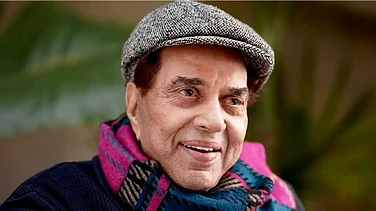As we experience the golden glow of completing 100 years of celebrating the phenomenon called Dev, the eagerness and desire to live the Dev Anand era again remains alive. Even though his epoch has passed, it still lives on in a way. It continues to knock happily on our doors, imbibed in the cinema of today. The reason behind this is the timeless, lively and eternal presence of that unique superstar, who turned his entire life into a nomadic journey full of fun, wanderlust and an eclectic mix of miseries-joys, keeping the fantasy of life alive in films so that we could survive the harsh ground realities.
The serious-sorrowful demeanour and mannerisms of Dilip Kumar have been much acclaimed as he played characters that symbolised the lower-middle and sometimes upper-class characters of a society undergoing modernisation. Similarly, Raj Kapoor’s innocent and simple portrayals as he tried to read and recite the Indian mind have carved their space among the public. However, the playful and handsome, shining face of Dev Anand has dominated our minds like no other, right from the time of black-and-white films to the recent riots of colours. This hero puffed away all the worries with smoke (har fikr ko dhuen me udata chala gaya …) and ruled the industry, depicting the struggles of youth in the first two decades of his cinema, while later also keeping up with the changing times.
The best examples of Dev’s changing hero are the double roles of Captain Anand and Major Verma in Hum Dono, and then, of course, Raju guide from Guide, who introduces a new philosophy and spirituality to Hindi cinema through the changes in his life and brings out this self-realisation on-screen faultlessly. The highest form of self-realisation is attained when Raju guide transforms into the selfless character of the Swami. The film Guide alone could be considered the epitome of Dev’s performances, a marvel that transports the peak of human life into a parallel plain, placing it into the centre of the human soul.
The hero of Guide does not merely have a change of heart but is shown to experience such a transformation that the Raju-turned-Swami does not even need to atone in his new avatar. These two specimens of the hero had already been unveiled in some of Dev’s most romantic and brave depictions in Hum Dono, mired in layers of self-evaluation and self-conflict. But his romantic portrayals of a hero fighting the real internal conflicts did not stop at Hum Dono. It was as if Dev had been waiting for the next mega-transformation in Guide’s protagonist. All the characters of RK Narayan’s novel gained new meanings when they appeared on the big screen.
The over 60 films that formed and honed young Dev Anand’s talent and image between 1946 and 1965 are different in their perspective than the Guide period. It is the worldview and spirituality of Guide that provides a different aura to the hero after his disillusion/transformation. Only legends like Goldie (Vijay Anand) and Dev could have turned such a complex and layered canvas of life in a work of fiction into a dextrous screenplay and an amazing film. Breaking the shackles of fiction, Guide also manages to bring out the confused and mesmerising protagonist through the stormy flashbacks.
The cinematic depiction of a modern negative character situated in the 1950s-60s in the self-reflective expression of Guide (1965), rises above the endless human failures of ‘self’ and the ‘other’ as the swami is freed of the dark shadows of suffering. Such an attempt at self-reflection was unheard of in films previously.
Guide’s Raju or Swami, has a rosy past, which is almost erased subsequently. In a famine-affected area, it is only he who holds on to hope from rain-bearing clouds that appear suddenly—sustaining the popular aspirations of the impoverished locals. They have turned him into their messiah, the repository of their trust, in those desperate days of fasting. Even he keeps the dithering flame of hope alive only with the help of some unknown power. However, there is something else present backstage, as one last “re-take” remains. Swami aka Raju disrupts Rosie’s heartbeats at a time when his fame as the Swami is at its peak. The restless-distraught Rosie is moving, stumbling down the same path. Before she meets her ‘swami’ (lover) after ages, something completely unexpected happens there. Amazed by Swami’s popularity, a journalist from an American channel suddenly asks him “Have you ever loved anyone?” And it is precisely then that a barefoot, half-unconscious Rosie falls upon Swami’s feet.
This precious moment is not just about meeting a long-lost idol-lover, or encountering Raju Guide again. It is also a hint that the long-lost relationship still survives in some form, despite having become feeble.
This theme of loving or complex relationships breaking and yet hanging on to each other has also moved other Hindi filmmakers. It would sometimes appear in plots in the form of an unusual affair in the heroine’s life as she gets close to a “second man,” often a rich man. Here, the sphere of personal discord is not such that it would appear suddenly unbroken again within or around the newfound worldliness of someone’s life, as part of a feminist discourse. The fact that this is possible, makes a neo-classical reading of Guide an infinite process.
Dilip Kumar rose to fame through Devdas, and remained the ‘tragedy-king’ all his life. As for Raj Kapoor, he was left with the simplicity of the defeated lover, the broken heart of Hiraman, right from Jagte Raho to Mera Naam Joker. More than a hero, his lasting image was that of an affluent businessman in the film industry. Diametrically opposite this stands Dev Anand, the lone star in the cinematic sky who lived romanticism from every angle, and made it come alive in everyone’s heart. It might be the biggest irony that in his most personal experiences, he was found saying “the man on the top is ultimately left alone.”
(Translated by Iqbal)

















